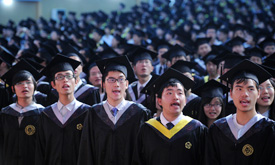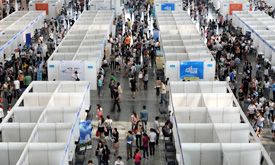|
 |
 |
|
A NEW START: Graduates from the University of Science and Technology of China sing their university anthem at the graduation ceremony on June 20 (XIANG CHUNLEI) |
OUT OF CAMPUS: Graduates browse a job fair in Nanjing, east China's Jiangsu Province, on May 27 (LIU YIFAN) |
This July has seen some 6.8 million fresh graduates stepping out of Chinese colleges and universities, many of whom were born between September 1989 and August 1990. The first wave of the "post-90s generation" is poised to take their first steps into the world of employment.
The term refers to anyone born between 1990 and 1999. Differing from older generations, people born in the 1990s have largely been able to embrace the material wealth of China's reform and opening up, which informs their distinct characteristics.
"The post-90s generation grew up in the Information Age and so possesses advantages such as being more flexible, creative, confident and quick to learn," said Hu Xudong, a professor at the School of Foreign Languages of Peking University.
However, they are also thought to be more self-centered and proud than their elders, who watch curiously as the new generation trickles into the job market. People are wondering how the new generation will make their life in the adult world.
Interest is No.1
"Selfish," "naïve," "spoiled" and "rebellious" are used to label the post-90s generation, but in their own eyes, their so-called rebelliousness means imagination, open-mindedness, courage and innovation.
"I don't mind being labeled as a post-90s kid but I want people to know our generation is also an outstanding generation," said Tan Wei, a Tsinghua University graduate born in early 1990.
Tan studied software engineering at the university and is working as an intern at a state-owned company. Despite an attractive salary, he still plans to quit the job.
"I don't like the working environment of the company because it restrains my creative thoughts. My ideal job is that can provide me a free environment and a promising future," Tan said.
According to Lin Lei, Chief Inspector of Human Resources at Microsoft Asia-Pacific Research and Development Group, the new post-90s graduates care more about what kind of training and growth the job can offer them rather than salary or insurance benefits, the essential priorities of post-70s and post-80s graduates.
"They attach more importance to development prospects and fulfillment of their emotional needs," Lin said.
This means that what the post-90s generation demands from a first job is a good match to their interests, a suitable working environment, flexibility and other factors aside from salary.
According to a 2010 survey conducted by Zhaopin.com, a leading Chinese job-hunting website, post-90s generation workers place more emphasis on "doing a job that they enjoy" than other factors, such as pay and conditions. The survey involved 7,261 post-80s and post-90s respondents.
The post-90s generation hopes to establish a relaxed working relationship on a more equal basis than their predecessors, according to the survey. They also rank personal well-being before seeking external achievement. More than half of the post-90s generation respondents prefer easygoing, mild-tempered and savvy employers. A surprising 10 percent wish to be "casual buddies" with their supervisors.
Human resources experts say that the well-fed post-90s generation is well-informed and unconcerned about the basic necessities of life. They have a stronger awareness of "self" and how they relate to the outside world.
| 